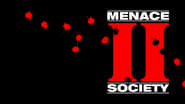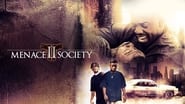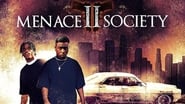jaroyan
Having waited decades to see this film as I knew it could not stand up to Singleton's masterpiece, I am again disappointed in the Hughes brother an attempt at cinema. As always, the writing is terrible and the few decent scenes of acting are only to be found with Khandi, Samuel and Mr. Duke. I've never understood the attraction to this film other than moron who wanted to be hoods and as an adult it does not resonate one iota with reality or cinematic grandeur. Everything these brothers do looks like they were most influenced by blacksplotation, but they have no sense of humor, levity or self-awareness.
Steve Pulaski
Menace II Society shows growing up in an impoverished urban area plagued by violence by detailing numerous different perspectives; compassion, aggression, resistance, compliance, brute force, contentment, and more. Various scenes in the film, which is largely a string of vignette-style events strung together rather than a fully formed plot, focus on characters discussing their motivations to either combat or work around the violence in their area, with some choosing to try and fight it by contributing to it, and others simply trying to function in a community that is more like a warzone.The Hughes Brothers, Albert and Allen, who directed and co-wrote the film with Tyger Williams, craft their film around two young black teens growing up in South Central Los Angeles. One is Kaydee "Caine" Lawson (Tyrin Turner), who's father was a drug dealer killed when he was only ten, while his mother was a heroin addict who died shortly after. He went on to live with his grandparents, though their strict, moralist attitudes rooted in religion didn't stop Caine from becoming a petty drug dealer like his father. The other young man is Kevin "O-Dog" Anderson, who shows his best friend Caine what he can really do when the two go to a Korean-owned cornerstore to buy malt liquor and the owners watch them suspiciously and nervously walk around the store. After the cashier makes a derogatory comment, O-Dog loses his cool and winds up shooting both the cashier and his wife before robbing the cash register and taking the surveillance tape. Just another day in South Central, it seems.The film winds up showing the day-to-day life of Caine and O-Dog, which involves Caine nearly dying after being shot in a carjacking, as well as petty crime involving cracking cars for insurance money. We also get a glimpse in the life of Ronnie (Jada Pinkett), a single-mother with a young son she is desperately trying to shelter from the bleak environment and unrelenting violence that engulfs the neighborhood. Her character's introduction begins the Hughes brothers' descent into examining different perspectives of the neighborhood.Consider the scene where Caine is playing with Ronnie's young son, who is clearly growing up fast for a five-year-old, as he loves to be able to hold Caine's pistol, drink liquor, and hang out with the crowd of older boys. Ronnie is disgusted by Caine's compliance with allowing her son to hold a pistol and hang with his friends as they sip some of their ostensibly endless supply of malt liquor and smoke marijuana. Caine claims that this is for the young boy's good, as this is a rough and rugged neighborhood that laughs at kids who are kept from witnessing the violence in such a miserable landscape. The Hughes brothers allow you, as a member of the audience, to judge for yourself on both perspectives and hear each of their characters out; it is because of this even-handed approach that we see that Caine's point, while holding weight, also shows the cyclical pattern of young black men getting incarcerated or killed at a young age due to violent crime or the solicitation of drugs, and we understand Ronnie's protectiveness as a parent, but wonder if that approach is also just buying time for another funeral.The Hughes Brothers take a very liberal approach to Menace II Society in terms of crafting its characters. Unlike John Singleton's directorial debut Boyz N The Hood, a film that illustrates how and why you should care about its characters and why they are all smart men stuck in a hopeless situation, Menace II Society never gives you a reason to like Caine and O-Dog. By the conventionality of Hollywood cinema, we, the audience, should detest Caine and O-Dog for their criminal ways and their unconscionable resort to violence and immediate gratification whenever they get the chance. The Hughes Brothers likely feel the same way, but they challenge us to find reasons for us to care about them throughout the course of the film, and see if we can find even some sympathy for their situations.For much of the film, I didn't feel too sympathetic, until the third act, which takes a strikingly raw turn. Granted much of the film is captured with a gritty sense of realism, one doesn't really see the ugliness unfold until the third act, when karmic revenge circumvents and finds its lead characters unprepared to lie in the bed they've made for themselves. Menace II Society's only lacking feature is the Hughes brothers' directorial choices; the camera never seems to stay still, and either finds itself oscillating around the main characters in a 360 degree fashion or loosely tracks its location in a way that sort of oddly details spatial relations between characters and their surroundings when there's really no need to do so.With all that being said, Menace II Society winds up using its narrative and directorial grittiness in a manner that's germane to its illustration of various character perspectives in how to deal with growing up in a tumultuous neighborhood. The end result bears all the pain, immediate gratification, and whirlwind of emotions you'd expect and winds up being one of the strongest dramas I've yet to see that details the hood in a painfully realistic light. Finally, it works to emphasize that while your drug-dealing and violent crime is indeed a menace to society, it's also makes, perhaps equally significant, a menace to yourself.
tieman64
"We are being asked to take even larger doses of a medicine that has proved to be deadly and to undertake commitments that do not solve the problem, but only temporarily postpone the foretold death of our economy." - Hieronymos II (head of Greece's Orthodox Church) "A nation that continues year after year to spend more money on military defence than on programs of social uplift is approaching spiritual doom." - Martin Luther King, Jr "Austerity is difficult, absolutely, but it's necessary, for rich and poor alike, black and white." - Frank Campbell"The more things change, the more they stay the same." - Jean Baptiste Karr Albert and Allen Hughes direct "Dead Presidents" and "Menace 2 Society". Both films purport to be "serious" examinations of the trials and tribulations of post-Vietnam African Americans, but in reality function more as giant exploitation films. The influence here is Scorsese's "Goodfellas", which the young Hughes brothers – the perfect age to be seduced by Scorsese's pyrotechnics - attempt to mimic blow for blow. And like Scorsese's film, though absent of his considerable style, the Hughes' work here is thin, melodramatic and sensationalistic, with deaths, screams, headshots, bombast, snorting, swearing and fury schematically rolled out to shock, bludgeon and titillate rather than edify. An entire resurgence in African American film-making would be corrupted in the early 1990s with such films."This is how it really was," the brothers would claim in interviews, positing their early films as a response to John Singleton's (underrated) "Boyz n the Hood". Their films, the brothers claimed, portrayed the reality behind Singleton's supposedly "rosy" portrayal of the African American experience. But time has been unkind to their pictures. And as the baseline for what constitutes "realism" constantly moves, today "Dead Presidents" and "Menace to Society", once touted as being a form of "black neorealism" or "black naturalism", seem hilariously overcooked and gratuitous. And as with all these films, there is little understanding of why our cast of African Americans do what they do, behave how they behave or examination of the power structures and psycho-socio-economic forces at work. (Both films essentially boil down to blacks killing for money; but "economics" is itself the cause of "the problem", stretching all the way from Vietnam to the Slave Trade to the Roman Empire) Still, there are good moments scattered about. "Menace to Society" opens with its best scene, an impromptu robbery/massacre in which a couple of black kids shockingly gun down the Asian shop-workers who insulted them. If disrespect is the root of all violence, we see that here, the larger marginalization of, or systemic disrespect toward, African Americans breeding both feelings of unworthiness and its opposite, a kind of manic need to protect, sometimes violently, brutalized egos. Black culture may have been mocked in the 90s for its "bling", its hysterical materialism, but this, as well as the numerous riots which rocketed across the US in the early 90s, was an understandable "response" to both widespread feelings of neglect and a culture with conflates wealth and worth. One should not have to prove one's humanity, one's worthiness, and when one is constantly forced to do so, pressure builds and one sometimes snaps. What's pertinent about "Menace's" "snaps" is that the victim's of such black aggression are always minorities or other blacks. Meanwhile, white faces are absent from the picture. Society functions in a similar way, Power deflecting hate away from itself – "down" the "social hierarchy" - and onto others. Unfortunately the rest of the picture degenerates into gratuitous gore and violence.Better than "Menace" is "Dead Presidents", which opens in 1968 and attempts to charter the lives of three friends (played by Larenz Tate, Chris Tucker, and Freddy Rodriguez) from the Bronx. They fight in Vietnam, are abandoned by the state, struggle to make a living, battle addiction and are then drawn to a life of crime.Like "Menance", "Presidents" at time shows traces of political savvy – one of the guards killed during the robbery is himself a Vietnam vet - but sensationalism, cynically employed shocks and thriller set pieces eventually undermine claims to earnestness. Blame Scorsese for this. Singleton's "Boyz n the Hood" was released before "Goodfellas" and so is stylistically somewhat different from most "African American" films of the period.5/10 – Worth one viewing.
ben-mcapson
I'm not saying it's a poorly made movie, despite all the continuity errors, but I can't stand being asked to sympathize with a complete scumbag. Mr. Butler: "Being a black man in America isn't easy. The hunt is on, and you're the prey!!! All I'm saying is... All I'm saying is... Survive! All right?"Well, let's see, he carjacks a poor guy in a fat-food lane, threatening to kill him for not ordering cheese on the burger. He knocks a girl up then treats her like utter garbage. Her cousin comes to defend her honor and this pig stomps on him, and kicks him when he's down. He's dishonorable, a liar, a villain, a fiend, a murderous cad. But that line above from Mr. Butler makes it sound like we're supposed to pity him. I feel sorry for his grandparents, I feel sorry for the Korean shopkeeper, I feel sorry for Ileana, I feel sorry for her cousin, and I feel sorry for carjacking victim in the fast-food lane... all of which are Caine's victims. So let's amend the quote to be a little closer to reality: "Being a black man in America isn't easy, but it could be easier. The hunt is on, and you're the predator!! All I'm saying is... All I'm saying is... Let other black people survive! Leave them alone! All right?"







